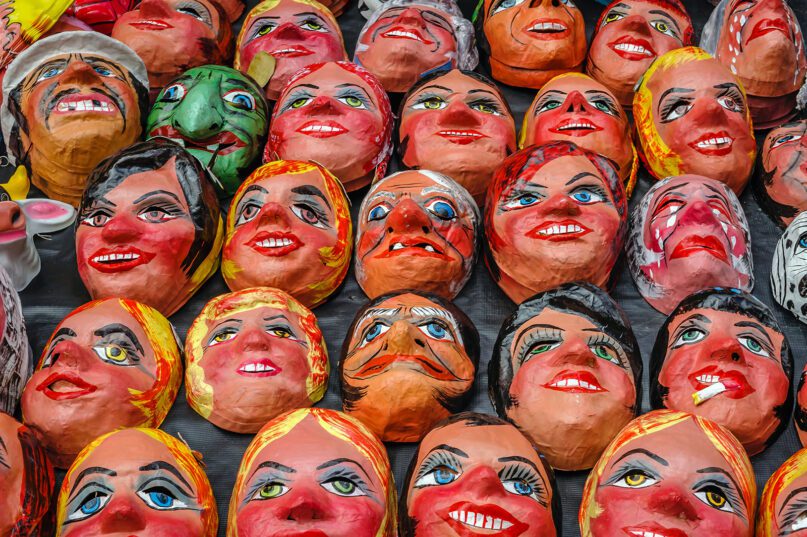(RNS) — By most social standards, my life is going well. I am healthy, live independently and comfortably care for my family. I’ve published two books — the latter doing significantly better than the first. I know what it’s like to wear many hats — mom, aunt, PR coach and friend — and to enjoy the esteem of colleagues and friends alike. I have the mental and physical space to dream and to implement many of those dreams.
But as the poet Paul Laurence Dunbar wrote: “We wear the mask that grins and lies, It hides our cheeks and shades our eyes — this debt we pay to human guile; with torn and bleeding hearts we smile, and mouth with myriad subtleties.”
I wear a mask. The labels that represent me — committed Christian, talented author, well-connected publicist — do not tell the whole or even partial story of my life. My pride sometimes blocks authenticity. Though my ego has a vested interest in me looking like I have it all together, I have a pain that shatters me; I am the daughter of a drug addict.
Having a dad with a substance abuse issue means that I learned long ago I could not trust my father to tell the truth. A father is supposed to be a daughter’s hero, a person from whom she doesn’t need protection. That’s not my story; I must love with boundaries.
RELATED: Fixing America’s failing families: An interview with T.D. Jakes
Yes, substance abuse is a disease. But that doesn’t mean I don’t get frustrated with its ill-fated effects. I know what it’s like to plan major and minor events understanding that my dad will almost never be present or act normal if he does manage to show up. During my mom’s funeral, my dad rocked back and forth, visibly troubled by not just grief but a life of chemical dependency. Though I was mourning, I felt I should simultaneously care for my dad. I wanted to wrap my arms around him, but needed him to wrap his arms around me.
I would like to say that this realization hurt, but I became masterful at numbing the pain. Until I couldn’t.
The times I find it difficult to numb out are as simple as they are routine. When I take my daughter to extracurricular events, my heart breaks when I see grandparents showing up for their kids and grandkids. When friends and associates talk about being a daddy’s girl, or doing Sunday dinner with dad, I secretly wish that too was my story. Why couldn’t the father of my youth — the one who took me to church assemblies, worked hard and instilled important life lessons — be present now? Why had I been robbed of his physical and emotional presence?
Typically, I shove these feelings into deep recesses of my heart. Occasionally, they burst from tightly barricaded spaces. There was the time my dad broke his neck by means our family has yet to discover. There was the time my dad showed up at my place of employment asking for money. There was the time he trashed the condo he rented from me. Although I was angry in the moment, I eventually concluded that I set him up to fail — why had I expected him to care for property when he wasn’t demonstrating care for himself?
Most recently, another family member called to share that they found a video of my dad talking about drugs as though he was doing a promotional ad for a product launch. The video was posted on Instagram for all to see. I cannot begin to describe the agony of learning about and then seeing the video. I wanted nothing more than to usher my dad out of public view — not just because he didn’t deserve exploitation, but because I didn’t want anyone to see.
As I pondered a litany of questions, I realized part of my reaction was rooted in pride. Sure, I was saddened, but I was also embarrassed. I was focused on how my dad’s behavior made me look.
Lest I minimize these emotions, what I’m describing is pride, and pride is anything but benign. In the Gospel of John, we learn that “God resists the proud but gives grace to the humble.” Equally sobering is the Scripture in the biblical Book of Hebrews, “We have not a high priest who cannot be touched with the feeling of our infirmities … and that we can come boldly to the throne of grace to obtain mercy and help in times of need.”
This means I can be vulnerable because Jesus can resonate with every feeling of hurt, disappointment, sadness and anger I experience. I do not need to hide or wear a mask. I can be seen and known.
But for a long time, few people saw. One of the few places where I was vulnerable was my support group, one specifically for families of drug-addicted loved ones. On Zoom calls or huddled into a room at our church, Vineyard Columbus, we confide in and console one another, sometimes through tears, other times through attentive listening, and other times through quiet resignation. In those gatherings, we lean on our shared belief in God’s unwavering love for us as well as our loved ones. It’s one of the rare spaces where I’ve brought my entire self, not just the portions that photograph well.
As I continued to process the video, I realized that “daughter of an addict” is as accurate a reflection of my life as is “PR professional.” The ironic thing is that as a PR professional, I spend considerable time helping clients project the best image possible. In other words, I help them put on their mask. Somewhere along the line, I began wearing a mask myself. But my mask didn’t obliterate the problem; I just suffered behind it.
My truth is not mine alone. As James Baldwin has said, “You think your pain and your heartbreak are unprecedented in the history of the world, but then you read.” There are approximately 20 million individuals in the U.S. with a substance use disorder. Those individuals have families and friends who are similarly impacted by their illness. But the question becomes, will we heal even as we pray for our loved one’s healing?
RELATED: Birthright Israel brings Jews in recovery to Israel
In the words of Tiffany Nicole’s 2020 book, “Lavender”: “I want to heal. So, I’m making a conscious decision to expose my wounds. I will no longer hide my scars or numb my pain.”

Jennifer R. Farmer. Photo by Jehan Photography LLC
I am finally free to take off my mask, understanding that people cannot help me if they cannot see me. In shedding my mask, I hope to encourage others to shed theirs too.
(Jennifer R. Farmer is the author of “First and Only: What Black Women Say About Thriving at Work and in Life” and a public relations adviser to some of the nation’s leading social and racial justice advocates. The views expressed in this commentary do not necessarily reflect those of Religion News Service.)





